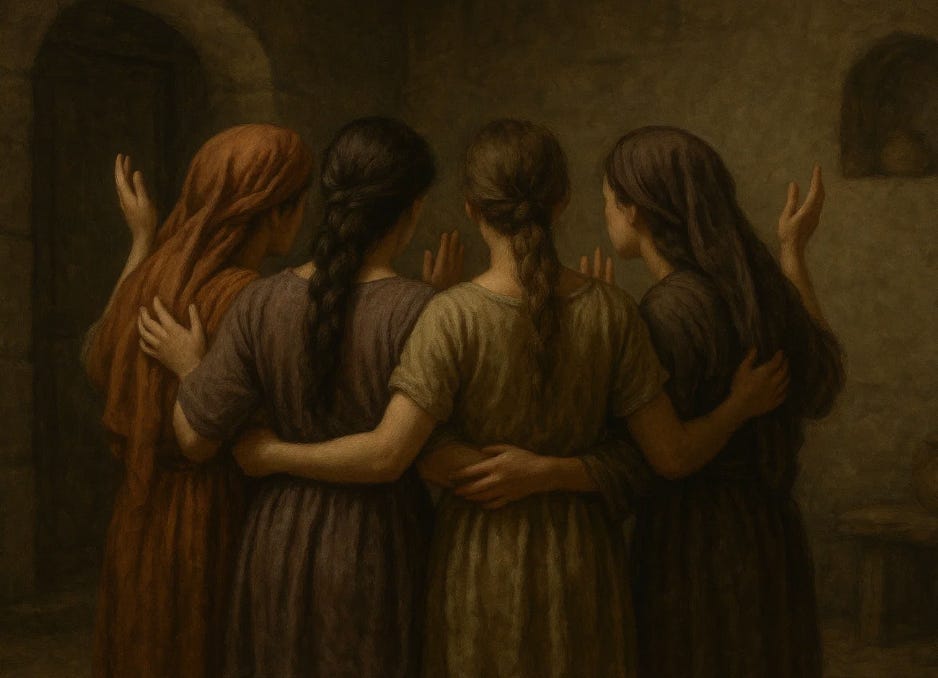As we follow Paul’s journey to Jerusalem and his stay at Philip the evangelist’s house in Caesarea, it’s easy to skim over a brief line - just seven words in Acts 21:9: “He had four unmarried daughters, who prophesied.” Nestled between the movements of Paul’s mission, it’s a short verse that holds a profound glimpse of Spirit-filled ministry - quiet, powerful, and enduring.
Philip the evangelist had settled in Caesarea, his itinerant days behind him, and into his home walks Paul, on the brink of arrest and hardship. It’s here we’re told of these four young women. No names given. No details of their prophecies. Just a simple, potent truth: they prophesied, and then the story moved on - but not for us. We’re pressing the pause button.
Now, we may want specifics - what did they say, to whom, when? Which daughter was the most accurate? How did they see, hear, know? Scripture doesn’t tell us. But their presence speaks volumes. They are there, present, large as life. These women operated in a prophetic gifting recognised by the early church. They weren’t anomalies; they were standard-bearers, modelling what the Spirit was doing in homes, not just synagogues.
The timing is significant too. Paul is heading to Jerusalem, a city simmering with tension. His path will lead to chains, trials, and eventually Rome. These daughters likely spoke into that trajectory - words shaped by the Spirit for a church on the move.
Their prophecies weren’t sideshows. They were mission-aligned, Spirit-breathed utterances likely shared within the household or in gatherings among the faithful. Not dramatic performances, but Spirit-led insight anchoring the church’s forward movement. The church hadn’t yet drifted into rows of polite silence - where spiritual gifts are explained away with a shrug, or dulled down in the name of being seeker-friendly. This was no environment of cautious irrelevance or legalistic restraint. God was at work - in homes, in lives, in real time. In that atmosphere of faith, obedience, and raw trust, heaven wasn’t quiet. The Spirit spoke.
And right in the thick of it stood Philip’s four unmarried daughters. They didn’t just dabble in prophecy - they embodied it. Hearing, seeing, discerning... they prophesied, and they did so with such clarity and frequency that no one had to be told. It wasn’t just a reputation. It was known. “Philip’s girls? The four of them? Oh, they prophesy.” They raised the bar - lives marked by revelation, grounded in devotion, flowing with the voice of God.
Their singleness is no throwaway detail. In the ancient world, an unmarried woman carried less social clout, yet Luke highlights it. Why? Because their lives were fully devoted to God’s purpose. Their singleness gave them freedom - not just culturally, but spiritually. They weren’t confined by domestic obligations. They were fully available. The point isn’t that singleness is superior, but that God calls people in every season and status to Himself — and uses them powerfully.
We also know from early Christian accounts that at least two of these daughters lived long lives and were sought out by believers for their wisdom. Eusebius, the Jewish historian, tells us that Papias, bishop of Hierapolis (around AD 60–130), knew and consulted with some of the daughters of Philip the evangelist. He describes them as extraordinary witnesses of apostolic faith - so trusted, in fact, that people travelled great distances just to hear them teach and affirm the gospel message.
They weren’t one-hit wonders. They were consistent, enduring voices - living witnesses of the resurrection life. When the dust of apostolic drama settled, these women were still speaking, still listening to the Spirit.
And that matters. Because what the church often misses today is this: prophecy doesn’t always need a microphone or a lectern. The Spirit works in kitchens, around dinner tables, in conversations before work or after Netflix. The next word from God may not come with a spotlight; it may come through someone we’ve overlooked - young, single, female, unnamed.
This passage offers no prescription, no checklist for who qualifies. Instead, it offers promise. The Spirit will fill whom He chooses. And when He does, gender, age, and social status become irrelevant. Joel prophesied it. Male and female. Young and old. Regardless of their career. Expect God to speak anywhere and at any time. To you.
We need to ask: do we make space for these kinds of voices? Are our homes spiritually alive, open to revelation, filled with expectation that the Spirit might speak - not just on Sundays, but on any given Wednesday evening (my home group night)?
The daughters of Philip, by example, invite us to take the Spirit seriously - not just in public, but in private. They challenge us to see singleness not as lack, but as possibility. They remind us that faithful prophecy is more than flair - it’s Spirit-alignment with God’s unfolding purpose.
So here’s the big call: foster environments where quiet voices are heard. Host homes where the Spirit is welcome. Don’t overlook the ones without titles or platforms, because in the household of God, every vessel yielded to the Spirit can carry the Word - and sometimes, it’s the overlooked ones who speak most clearly.
And that is no small thing. That’s the Gospel - inviting the unseen into the centre, turning ordinary homes into places where heaven speaks.
This is exciting!


